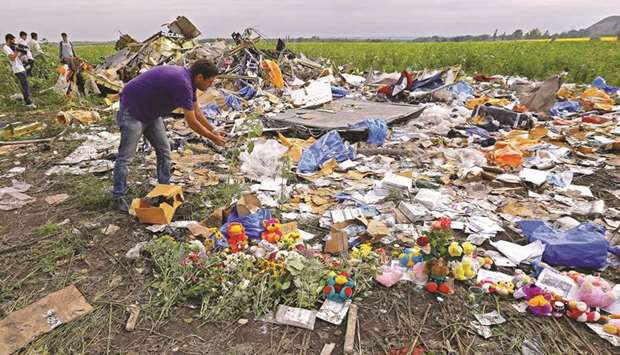Europe’s top rights court said yesterday that it had notified Russia of cases, brought by nearly 400 relatives of those killed in the downing of flight MH17 over Ukraine in 2014, that allege Moscow was to blame for the disaster.
The Malaysia Airlines jet was hit by a Russian-made missile over war-torn eastern Ukraine on July 17, 2014, killing all 298 people on board.
Russia, which has repeatedly denied responsibility for the destruction of the plane, has 16 weeks to respond to the request for observations, a representative of the European Court of Human Rights (ECHR) told AFP, adding that the whole process could take “several months or even several years”.
MH17 took off from Amsterdam heading for Kuala Lumpur but disintegrated in mid-air over eastern Ukraine.
Close to two-thirds of those killed on the flight between Amsterdam and Kuala Lumpur were Dutch.
A Netherlands-led probe concluded in May 2018 that the plane was struck by a BUK surface-to-air missile controlled by Russia’s 53rd Anti-Aircraft Rocket Brigade, based in the city of Kursk.
Australia and the Netherlands blamed Russia for the disaster.
The ECHR said in a statement that the cases against Russia allege that Moscow “was directly or indirectly responsible for the destruction of the plane and failed to investigate the disaster properly or co-operate with other investigations”.
Russia denies any responsibility for the mid-air destruction of flight MH17, and said none of its missile launchers had ever entered Ukraine.
However, Dutch Foreign Minister Stef Blok said last week that Dutch and Australian government officials had met their Russian counterparts to discuss who is responsible.
Australia has said it will seek financial damages for victims’ families.
In 2015, Russia vetoed a proposal by Malaysia, Australia, the Netherlands, Belgium and Ukraine for the United Nations Security Council to set up an international tribunal to prosecute those suspected of downing the aircraft.
The two cases have been brought before the court on behalf of 380 people from Australia, Belgium, Canada, Germany, Hong Kong, Indonesia, Israel, Malaysia, the Netherlands, New Zealand, the Philippines, the UK, the US, and Vietnam.
Five countries – Australia, Belgium, Malaysia, the Netherlands, and Ukraine – continue to investigate the disaster.
Meanwhile, the family of an American killed in the incident filed a lawsuit on Thursday against US-based money transfer companies and two Russian banks that they accuse of providing services to the group they blame for striking Flight MH17.
American Quinn Lucas Schansman, 18, was aboard MH17 on his way to meet his parents for a family vacation.
“We realise that we will never get our son back. But we are committed to shedding light on – and holding accountable – all who participated in his murder,” his father Thomas Schansman said in a statement.
Under the US Anti-Terrorism Act, the Schansman family are suing Sberbank of Russia, VTB Bank, Western Union Company and Western Union Financial Services, MoneyGram International Incorporated, and MoneyGram Payment Systems Incorporated for providing services to the self-proclaimed Donetsk People’s Republic (DPR).
“Defendants’ provision of material support to the DPR was a substantial factor in the DPR’s ability to launch a missile from territory it controlled – an attack that killed Quinn and 297 other innocent victims,” according to the lawsuit, filed in the Southern District of New York.
Western Union said that it took its regulatory and compliance responsibilities seriously, adding: “While we don’t comment on the details of pending litigation, we believe the claims asserted in this complaint are without merit.”
VTB Bank said that it had not received the complaint, and was thus unable to comment on it.
However, the bank added: “We’d like to firmly emphasise that VTB has never been or is in any way involved in financing of the Donetsk People’s Republic.”
MoneyGram and Sberbank of Russia did not immediately respond to requests for comment.
“The DPR systematically and openly solicited financial support from individuals around the world to help it procure weapons, ammunition, and lethal equipment,” said David Pressman, of law firm Boies Schiller Flexner LLP, which is representing the Schansman family.
“The money poured in with the reliable assistance of US-based money-transfer services and Russian banks,” said Pressman, who was deputy US ambassador to the United Nations between 2014 and 2016.
“The men who launched the missile may never be hauled before a court to answer for their crimes, but all of those who participated in arming them and supporting them must be,” he added.

This picture taken on July 19, 2014 shows a journalist inspecting debris from Malaysia Airlines flight MH17.
